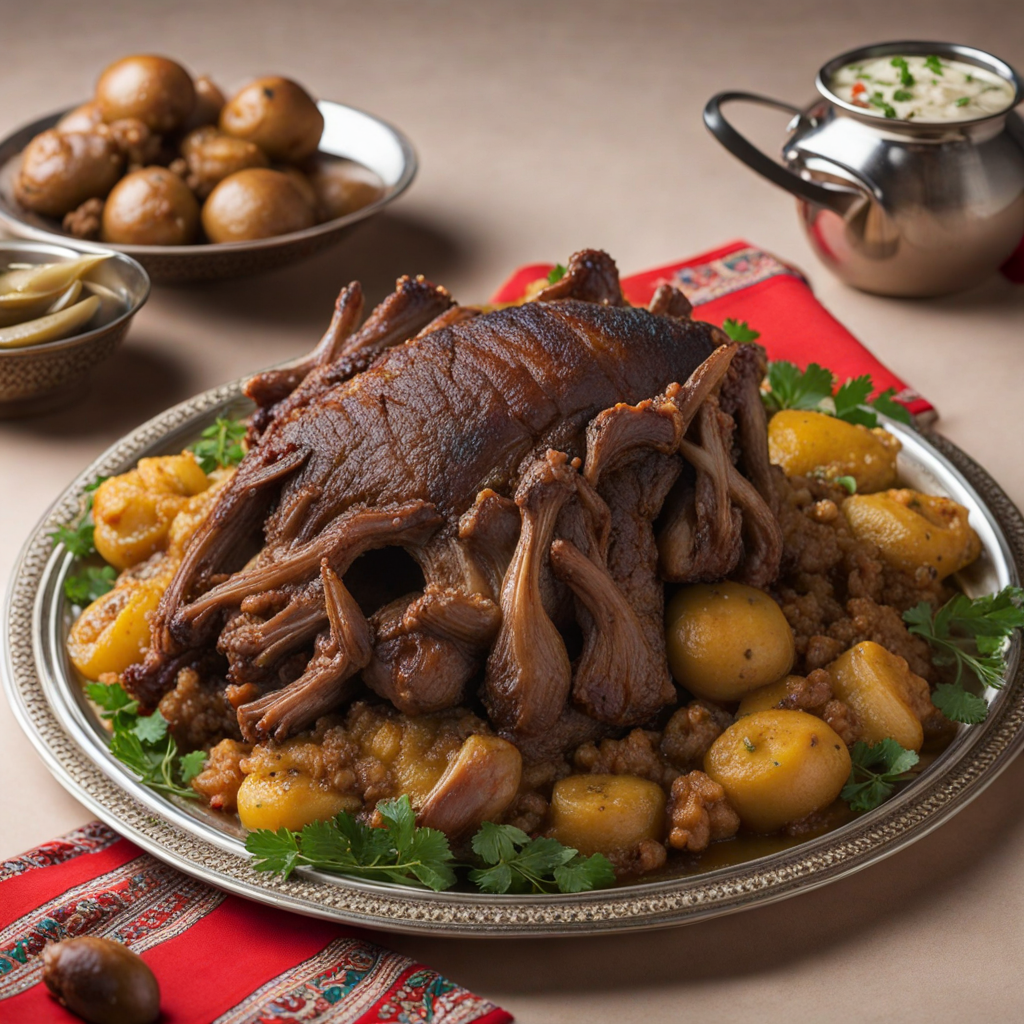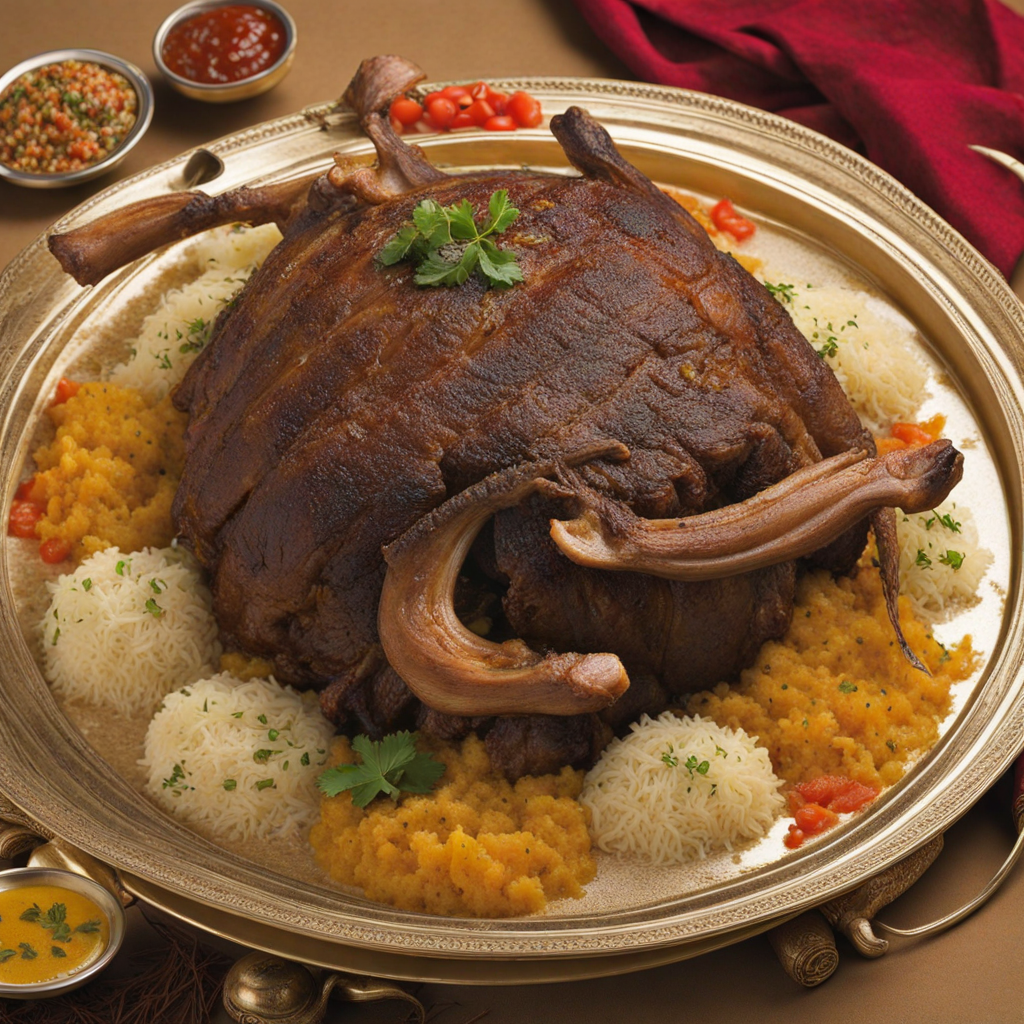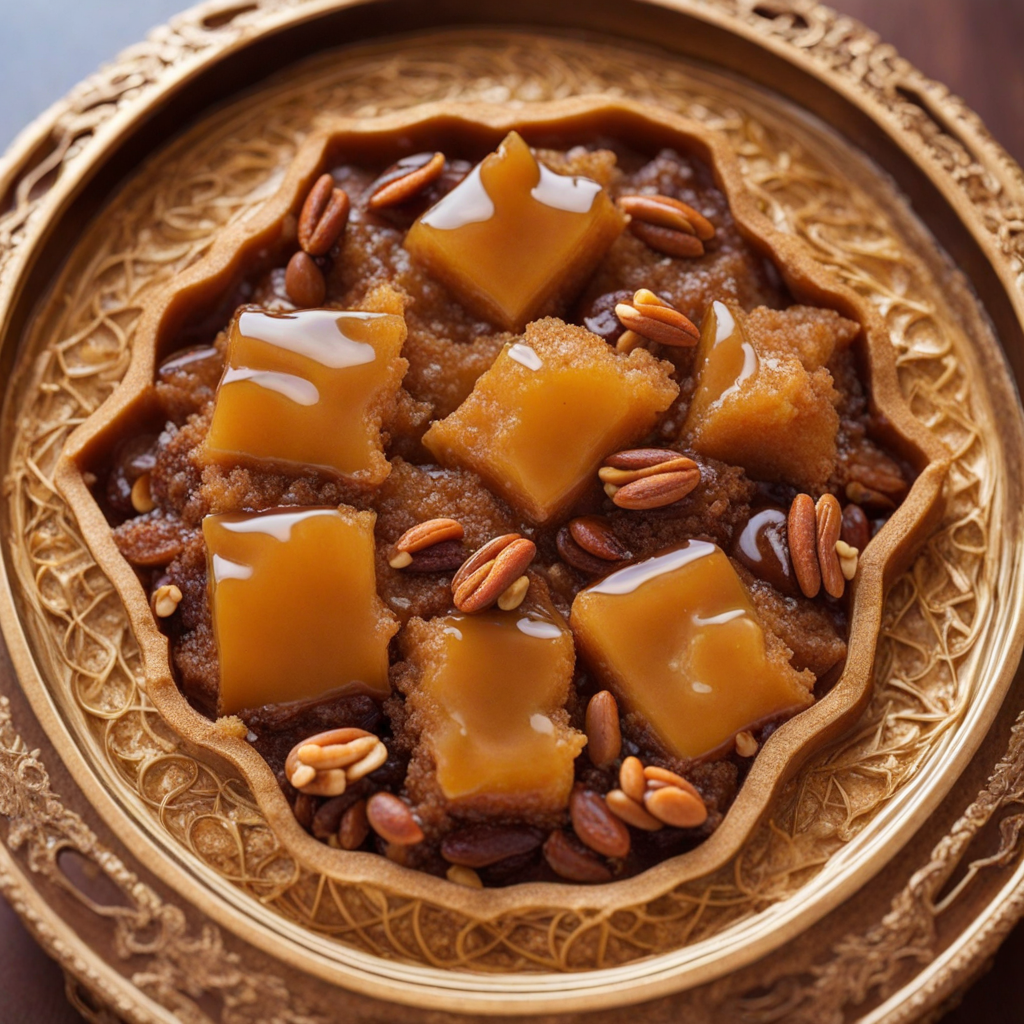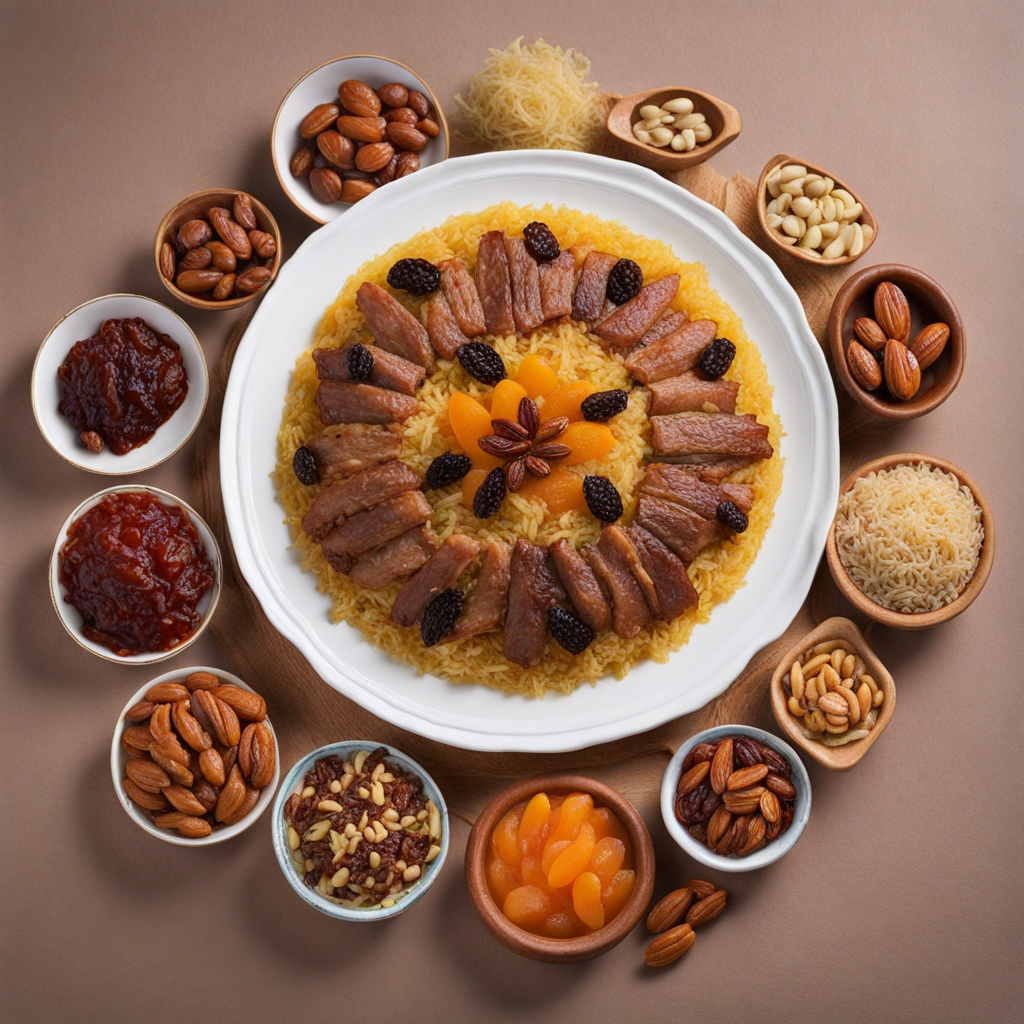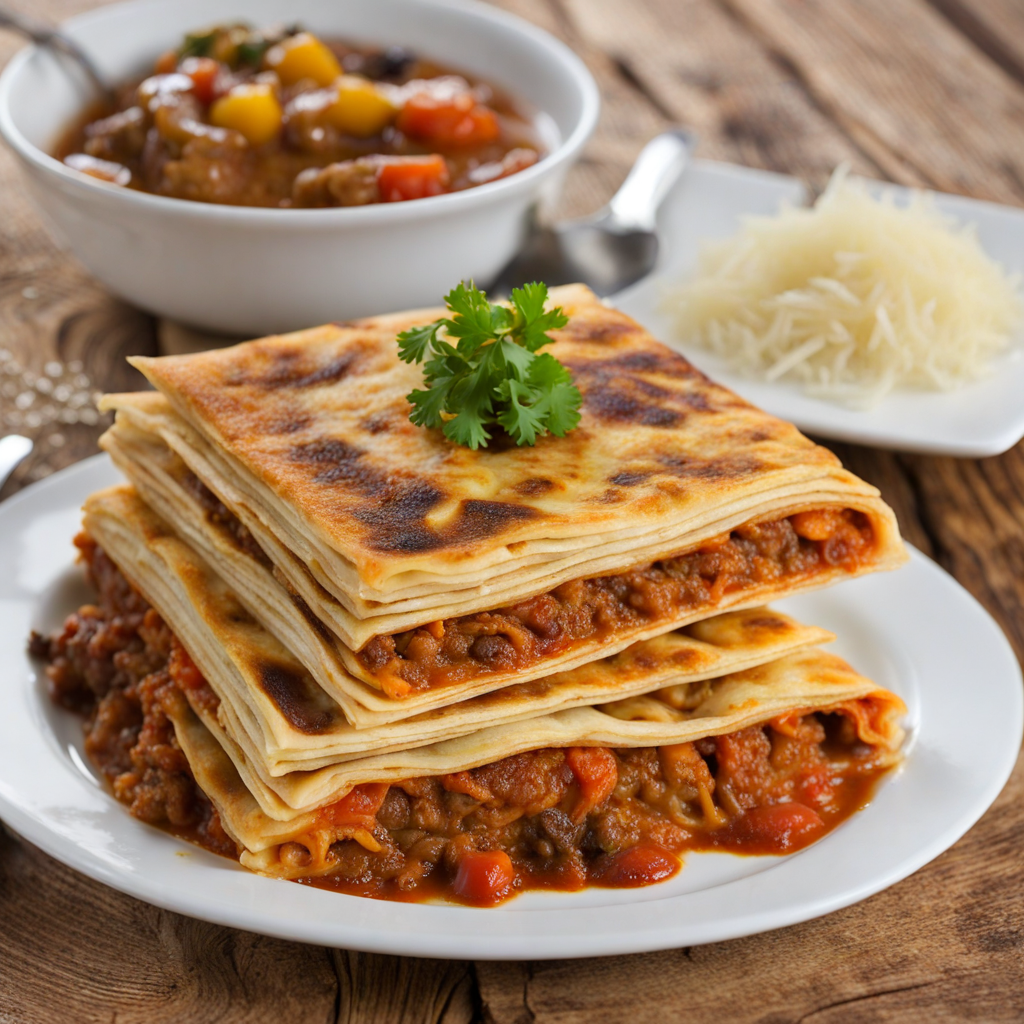Shuwa
Shuwa is a traditional Omani dish that embodies the rich culinary heritage of Oman. It consists of marinated lamb or goat, which is seasoned with a blend of spices such as cumin, coriander, garlic, and sometimes saffron. The meat is typically wrapped in banana leaves, sealing in the flavors and moisture, before being buried underground for an extended period—often up to 48 hours. This unique cooking method allows the meat to slow-cook in its own juices, resulting in an incredibly tender and flavorful dish that reflects the essence of Omani hospitality and tradition.
The preparation of Shuwa is often a communal affair, bringing families and friends together for special occasions and celebrations. The process begins with the meticulous marination of the meat, which is crucial for achieving the deep, aromatic flavors that define this dish. Once the meat is wrapped, it is placed in a pit filled with hot stones, allowing it to steam and cook to perfection. This slow-cooking technique not only enhances the taste but also infuses the meat with a smoky aroma, making each bite a memorable experience.
How It Became This Dish
The Culinary Journey of ‘شواء’ (Shuwa) in Oman #### Origins of Shuwa Shuwa, a traditional Omani dish, has deep roots in the cultural and culinary landscape of Oman. Its origins can be traced back to the Bedouin tribes of the Arabian Peninsula, where the practice of cooking meat in a manner that preserved its flavors and tenderness was essential for survival in the harsh desert environment. The word ‘شواء’ translates to ‘grilling’ or ‘roasting’ in Arabic, reflecting the method of preparation that is central to this dish. The preparation of Shuwa involves marinating a whole lamb or goat in a blend of spices and then cooking it underground in a sand pit, a technique that not only enhances the meat’s flavor but also reflects the resourcefulness of the Bedouins. This cooking method is believed to have been practiced for centuries, possibly as far back as the time of the ancient tribes that roamed the Arabian deserts. The dish embodies the nomadic lifestyle of these tribes, where food preservation and cooking methods were dictated by the environment. #### Cultural Significance Shuwa is more than just a meal; it is a symbol of hospitality, community, and tradition in Oman. The preparation and consumption of Shuwa are often associated with special occasions, such as weddings, Eid celebrations, and significant family gatherings. The communal aspect of this dish is particularly noteworthy; it is typically prepared in large quantities to serve many people, emphasizing the importance of sharing and togetherness in Omani culture. The preparation of Shuwa is a social event in itself, often involving family members and friends who come together to participate in the cooking process. This gathering serves as a way to strengthen bonds and build community ties, as the act of cooking and sharing food is a universal language of connection. The preparation also includes the use of traditional spices such as cumin, coriander, garlic, and turmeric, which are integral to Omani cuisine and contribute to the distinct flavor profile of the dish. #### Development Over Time As Oman has evolved through the ages, so too has the tradition of preparing Shuwa. Historically, the dish was primarily associated with the Bedouin lifestyle, but in modern Oman, it has transcended its nomadic origins to become a national culinary treasure celebrated by all Omanis. The practice of cooking Shuwa has also adapted to contemporary culinary techniques while maintaining its traditional roots. In the past, the preparation of Shuwa required a significant amount of time and effort. The process begins with marinating the meat, which can take several hours or even overnight to allow the spices to penetrate the flesh. Following this, a deep pit is dug, lined with stones, and heated with a fire. Once the stones are hot enough, the marinated meat is wrapped in banana leaves, placed in the pit, and covered with sand. This underground cooking method can take up to 24 hours, resulting in incredibly tender and flavorful meat. In recent years, with the advent of modern cooking appliances, some households have begun to prepare Shuwa using ovens or grills, particularly in urban areas where digging a pit is impractical. Despite these changes, many families still adhere to the traditional method, especially during festive occasions, as it reflects a commitment to preserving cultural heritage. The rise of tourism in Oman has also played a role in the evolution of Shuwa. As visitors flock to the country to explore its rich history and culture, many are introduced to traditional dishes like Shuwa. Local restaurants and hotels have incorporated Shuwa into their menus, often offering it as part of a larger Omani feast. This exposure has not only helped to promote the dish but has also encouraged a new generation to learn the traditional preparation methods, ensuring that the cultural significance of Shuwa continues to thrive. #### Shuwa in Contemporary Oman In contemporary Oman, Shuwa has become a culinary emblem of national identity. It is frequently showcased at cultural festivals, food exhibitions, and even international culinary events, where chefs demonstrate the traditional methods of preparation and highlight the unique flavors of Omani cuisine. The dish’s prominence in national celebrations, such as the Sultan’s birthday and National Day, further solidifies its status as a symbol of pride and heritage. Moreover, Shuwa has also inspired fusion cuisine, where chefs experiment with different meats, spices, and cooking techniques while still respecting the essence of this traditional dish. Such innovations have led to new interpretations, making Shuwa accessible to a broader audience while maintaining its core significance. As Oman continues to embrace modernization, efforts to preserve and promote traditional culinary practices, including Shuwa, have gained momentum. Culinary schools and cultural organizations are working to teach younger generations the importance of their culinary heritage, ensuring that the art of preparing Shuwa is passed down through the ages. #### Conclusion The history of Shuwa is a fascinating reflection of Oman’s rich cultural tapestry, showcasing the resilience and adaptability of its people. From its ancient Bedouin roots to its contemporary status as a national dish, Shuwa embodies the spirit of Oman—its traditions, hospitality, and community. As this dish continues to evolve, it remains a testament to the enduring connection between food, culture, and identity in Oman. Whether enjoyed at a family gathering or a festive celebration, Shuwa serves as a delicious reminder of the importance of culinary heritage and the bonds that food can forge among people.
You may like
Discover local flavors from Oman


